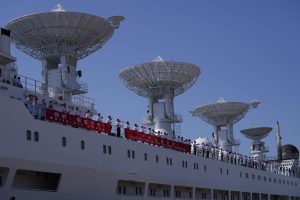The Chinese research vessel Yuan Wang 5 left Sri Lanka on August 22, six days after it docked at Hambantota Port. Analysts in Beijing, Delhi or Washington are unlikely to have been happy with how the event played out.
The incident confirmed what they had long suspected – Sri Lanka is not a reliable partner.
The Ranil Wickremesinghe government’s repeated flip-flops on the issue of the Chinese ship’s docking would have drawn the ire of all concerned parties. First, it authorized the ship to dock at Hambantota Port. Then two weeks after the ship had set sail from China, when reports of its arrival triggered frenzied reporting in the Indian and Sri Lankan media, it requested China to defer the docking of the ship.
While the arrival of warships to Sri Lankan ports is nothing new, and China had sent a similar research vessel before, India responded differently to the arrival of Yuan Wang 5 because it believed it has a better relationship with Sri Lanka now compared to the past.
India emerged as Sri Lanka’s lifeline amid the latter’s ongoing economic crisis. In the last eight months, India has provided $4 billion worth of assistance to Colombo in the form of credit lines, forex support and humanitarian assistance.
India has not done this for any other country.
According to a Research and Information System for Developing Countries publication, India’s contribution to the United Nations was $2.17 billion between 1947 and 2021. Its development assistance to all developing countries in 2021 was $7.66 billion. The assistance to Sri Lanka was not a small amount.
It is naïve to believe that any major power — or any country for that matter – will give billions of dollars to another country in aid and as credit out of the generosity. Not all Indians are happy with their government’s largesse. After all, with $4 billion, the Narendra Modi government could have improved the lives of millions of Indians.
Therefore, it is fair for Indians to expect Sri Lanka to display its gratitude to India, which would have been useful for the Modi government to justify its support to Sri Lanka, or at least keep in mind Indian sensitivities on the docking of a Chinese ship in the island.
According to sources in Colombo, Indian officials would have liked Sri Lanka to inform them of the authorization of a Chinese research vessel to dock at Hambantota. That they did not appears to have riled India, especially in the context of the latter’s recent support to the island nation.
I have earlier written that China has been losing interest in countries like Sri Lanka over the last decade. However, that does not mean that China lacks dedicated allies and can not exert sharp power when the occasion demands it.
After Sri Lanka decided to defer the arrival of the ship, a concerted campaign by friends of China, a coalition of left-leaning political parties, China friendship societies and public intellectuals came together to demand that the ship be allowed in. Despite a continuous campaign to villainize China, no political party except the Tamil National Alliance, which has deep ties to India, supported the decision to defer the ship.
All Sri Lankan leftwing parties pushed for the Chinese ship’s docking and given that Sri Lanka needs Chinese cooperation for debt restructuring, the government changed its decision again to allow the ship to come in. Apparently, Sri Lanka asked Indian and American envoys whether they had a concrete reason to oppose the Chinese vessel’s docking and the two countries were not able to provide an answer.
It is quite unlikely that any of the parties involved were happy about how the incident played out, especially since this is not an isolated incident. Almost all of Sri Lanka’s partners have had to face the shock of sudden changes in policy, which in some cases cost them substantial sums, especially during Gotabaya Rajapaksa’s presidency.
Japan had started to revive its relationship with Sri Lanka after 2015. However, the Gotabaya administration alienated Tokyo by scrapping Japan International Cooperation Agency (JICA)-funded Light Rail Transit (LRT) project.
Sri Lanka also turned down claims worth billions of rupees from consultants of the canceled LRT project, citing advice from Sri Lanka’s Attorney-General’s Department. The consultants had threatened to go for international arbitration, a move that could place further pressure on the Japan-Sri Lanka relationship, already strained by the unilateral rejection of the LRT project and the proposed development of Colombo Port’s East Container Terminal (ECT) by India and Japan. Having reneged on its deal with India’s Adani Group over the development of ECT, the Gotabaya administration awarded Adani a contract for the development of the West Container Terminal later.
The Gotabaya administration also angered China and Russia, two key allies of Sri Lanka. In 2021, Chinese companies were stripped of renewable energy projects in the Northern Province due to Indian pressure. These tenders were won through competitive bidding.
Earlier this year, Sri Lanka violated an agreement with Russia, where senior politicians had promised the Russians that Aeroflot planes will not be subjected to any international sanctions in Sri Lanka. Yet a Lankan court ordered the seizure of an Aeroflot plane, which resulted in Aeroflot suspending several flights to Sri Lanka and the latter losing a large number of Russian tourists.
The Wickremesinghe administration too seems to have inherited its predecessor’s penchant for changing its mind.
The impact of policy inconsistency will have a negative impact on Sri Lanka’s diplomatic relations with key partners, and foreign investments. This will surely make things harder for the island nation at a time when it needs foreign aid desperately to overcome a severe economic crisis.

































